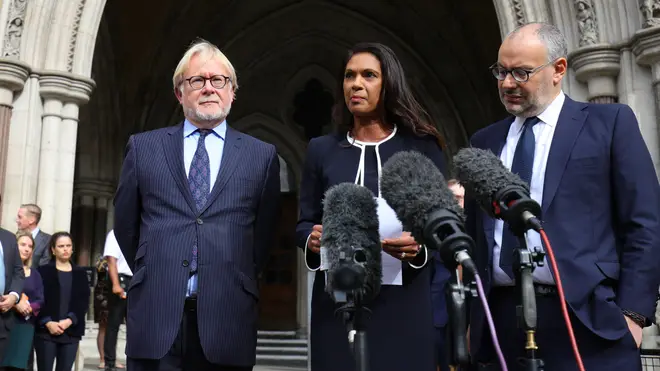
Ian Payne 4am - 7am
6 September 2019, 10:19

Anti-Brexit campaigner Gina Miller has lost her court challenge to Prime Minister Boris Johnson's decision to suspend Parliament for five weeks.
High Court judges rejected the legal challenge at the High Court in London this morning.
Ms Miller said she and her legal team “will not give up” following the court defeat.
Lord Chief Justice Lord Burnett, Master of the Rolls Sir Terence Etherton and President of the Queen's Bench Division Dame Victoria Sharp dismissed a claim brought against Mr Johnson by businesswoman Ms Miller.
Rejecting Ms Miller's case, Lord Burnett said: "We have concluded that, whilst we should grant permission to apply for judicial review, the claim must be dismissed."
MORE: Boris Johnson says he would rather be 'dead in a ditch' than seek Brexit extension
Their ruling comes in the same week the Prime Minister fought off a similar legal attack in Scotland.
Ms Miller's QC had argued that Mr Johnson's advice to the Queen to suspend Parliament for five weeks was an "unlawful abuse of power".
The judges were urged to make a declaration that the decision taken on August 28 to advise the Queen to prorogue Parliament was unlawful.
The urgent judicial review application brought by Ms Miller - who successfully challenged the Government at the High Court in 2016 over the triggering of the Article 50 process to start the Brexit countdown - was supported by a number of other parties, including former prime minister Sir John Major.
The action was contested by the Prime Minister, whose lawyers argued that the advice given to the Queen was not unlawful and that Ms Miller's claim was in any event "academic".
During the hearing, Lord Pannick QC, representing Ms Miller, told the judges: "The Prime Minister's decision to prorogue Parliament is contrary to constitutional principle and constitutes an abuse of power."
Follow the latest politics in our live blog
He argued: "There is no justification for closing Parliament in this way and, accordingly, it represents an unjustified undermining of parliamentary sovereignty which is the bedrock of our constitution."
Lord Pannick said the Prime Minister's decision to advise the Queen to suspend Parliament was "extraordinary" - both because of the "exceptional length" of the suspension and because Parliament will be "silenced" during the critical period leading up to the October 31 deadline.
In submitting that the judges should reject Ms Miller's arguments, Sir James Eadie, on behalf of Mr Johnson, said: "The exercise of this prerogative power is intrinsically one of high policy and politics, not law."
Arguing that the claim was "academic", he pointed out that each House of Parliament will sit before the UK leaves the EU on October 31 "and may consider any matter it chooses".
He told the court: "The prorogation does not prevent Parliament from legislating on any matter it wishes. Parliament is capable of legislating at pace if it chooses to do so."
The three judges are expected to give their reasons for dismissing the case in writing next week.
Rejecting the case, Lord Burnett said: "We have concluded that, whilst we should grant permission to apply for judicial review, the claim must be dismissed."
The judges granted permission for the case to go the Supreme Court for an appeal, which will be heard on September 17.
Speaking outside the Royal Courts of Justice after the ruling, Ms Miller said she was "very disappointed with the judgment".
"To give up now would be a dereliction of our responsibility. We need to protect our institutions," she said.
"It is not right that they should be shut down or bullied, especially at this most momentous time in history.
"My legal team and I will not give up our fight for democracy."
She added: "We feel it is absolutely vital that Parliament should be sitting. We are therefore pleased that the judges have given us permission to appeal to the Supreme Court, which we will be doing, and they feel that our case has the merit to be handed up.
"Today, we stand for everyone. We stand for the future generations and we stand for representative democracy."